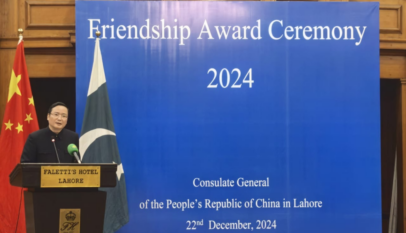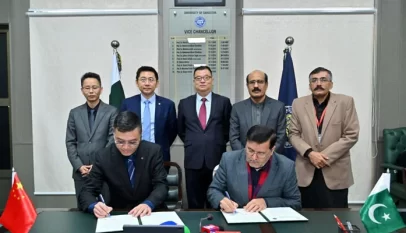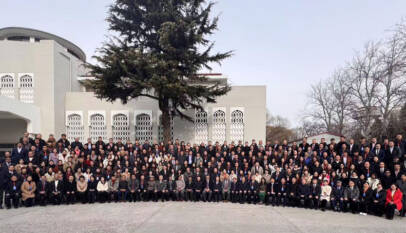Expert termed Chinese Governance a role model for Pakistan
Shakeel Ahmed Ramey, a political economist writes that Pakistanis are preoccupied with the results of the President Xi period and the Deng Xiaoping era, not with the process. There is relatively little discussion of Chairman Mao’s vision, struggle, and relentless efforts, as well as those of his comrades Zhou Enlai, Chen Yuan, Li Ping, and others.Mr. Ramay highlighted that we also avoid delving into the history of the humiliation century and the role of external forces, like as Japan and the West, in sparking the spirit of liberation and renewal. The CPC worked on cadre training and the development of high-quality human capital. Following Chairman Mao’s death, Deng Xiaoping assumed the mantle of leadership. He concentrated on development demands and presented a second major contrast: “people’s ever-increasing material and cultural needs vs backward social production.” President Xi has now taken the reins of power. He is steering the country toward the next stage of development and the realisation of the nation’s renewal aspiration. He has initiated a number of programmes, including the Belt and Road Initiative (BRI), to develop international economic ties. Mr. Ramey termed that the dynamics in Pakistan are completely different from those in China. There are many aspects that distinguish Pakistan and Pakistani society from China.
The debate on the China model is misdirected and flawed in Pakistan. The fundamental flaw is that Pakistanis are busy discussing outcomes, not the process. We try to analyse the President Xi era or the Deng Xiaoping era. There is very limited discussion on the vision, struggle and tireless efforts put forward by Chairman Mao and comrades like Zhou Enlai, Chen Yuan, Li Ping etc. We also do not venture into the history and importance of the century of humiliation and the role of foreign forces, including Japan and the West, in igniting the spirit of freedom and rejuvenation. China has never forgotten the dark 100 years, which were lost to struggle against foreigners. The memories of the opium war and the illegal occupation of resources are still haunting the nation. However, the Chinese do not mourn it. China considers it a guiding torch to avert any such attempt in future.
Chairman Mao and his comrades started the movement against oppressors—foreigners and national—under the auspices of the Community Party of China (CPC). They built the movement on the principles of their nation and the lessons learnt during those 100 dark years. They fought against oppressors for the people of China. They bore the brunt of the state and their foreign allies. They sacrificed their savings and lives. They faced every type of atrocities, but they kept their ground. Eventually, they were liberated from the clutches of their oppressors. The liberation of their country was the not end of their struggle.
This second wave of struggle was dominated by the goals of development, prosperity and equity among the citizens. It was a humongous task. As, at that time, the economy was in shambles and the total GDP was only 67.9 billion yuan and per capita income was only 119 yuan. Food insecurity and poverty were rampant. Life expectancy was only 35 years. Chairman Mao and his comrades were aware of all this and decided to overhaul the whole system to overcome these challenges. First and foremost, the important task was to train the nation and eliminate class differences. Chairman Mao gave the first principal contradiction “proletariat versus bourgeoisie” to curb the class differences. The party, under his command, launched a cultural revolution to eliminate class differences. To refine the governance system, the CPC, under his guidance, worked on three declared evils namely, corruption, waste and bureaucracy.
President Xi is routing the nation to achieve the next stage of development and the dream of national rejuvenation.
Simultaneously, the CPC continued to work on training the cadres and production of high-quality human capital. The CPC also introduced the concept of a leading role of indigenous wisdom in national development and prosperity.
Deng Xiaoping picked the mantle of leadership after the death of Chairman Mao. He started to build on what was laid down by the elders of the party. He focused on the development needs and introduced a second principal contradiction “the ever-growing material and cultural needs of the people versus backward social production.” Party, under his leadership, steered the nation to achieve the target of a moderately developed country. China progressed in leaps and bounds. The process continued even after his death. Successive leadership of the CPC continued to deliver and China became the second-largest economy in the world.
Now, President Xi has assumed the role of leadership. He is routing the nation to achieve the next stage of development and the dream of national rejuvenation. He has given the third principal contradiction “unbalanced and inadequate development and the people’s ever-growing needs for a better life.” He is navigating the nation to achieve the goal of prosperity at a societal level. Firstly, he launched an anti-corruption campaign, which is going on with great success. He is not sparing anyone from accountability. Secondly, he is leading the country to construct an ecological civilization. Thirdly, he is fostering international engagement. Fourthly, he has launched many initiatives, including the BRI, to strengthen international economic linkages. Fifthly, China, under his leadership, is in the process to become a formidable power at the global level.
From the above discussion, it can be inferred that today, China is a product of a continuous struggle of seven decades. The success was achieved through tireless efforts, continuous hard work and wise leadership of CPC. The success story of China can be summarized in eight points.
First, continuity of system is key to success. Community Party of China was conscious of the fact and took the responsibility to ensure continuity. Second, good governance is a fundamental instrument to achieve the development and prosperity of people. From the beginning, the CPC focused on it, especially on efforts to curb corruption. For that purpose, a strong accountability and monitoring mechanism was developed. There was a special focus on bureaucracy, as it was declared one of the evils in society. Party cadres were also strictly monitored. Third, CPC decided that class difference has to be eliminated for meaningful progress of society. Fourth, without struggle and sacrifices, nothing can be achieved. Fifth, people should be at the core of struggle, which should be supported and led by people. Sixth, it is the system that delivers, not individuals. Seventh, individuals must focus on the contribution for the long-term goal, not self-projection. Eighth, believe in indigenous wisdom to steer the process.
Now, if we look at Pakistan, the dynamics are entirely different. There are eight main factors, which make Pakistan and Pakistani society different from China. First, in Pakistan, no one is ready to struggle for common people. Pakistani leadership does not want to focus on people. They fight only for power. The ruling elite only fools the common people with nonsense slogans and dreams. Second, the class difference is very sharp and the elite class has consolidated its position. Third, the ruling elite is only fighting for its benefits and there is no space for common citizens in its agenda. Fourth, there is no importance and continuity of the system, only personality matters. Every political party considers its manifesto superior and the vision of its leader is the best in the world. Fifth, there is no movement of common people against the oppressors, rather all movements are being run and led by the oppressors. The worst part of the story is that common people are hesitant to struggle for their future. Sixth, the governance system is fragile, weak, has no teeth and is based on relationship, not merit. It has resulted in rampant corruption in the country.
Seventh, the Pakistani ruling elite do not have the interest to go for this process of evolution. They are used to slogans of quick fix and day-dreaming. They also do not have the vision to look beyond their interests. Eighth, intellectuals of Pakistan are heavily influenced by the Western models and they do not want to study ground realities. The state is also not interested in indigenous wisdom for finding solutions. It prefers to promote western philosophy and western consultants are its beloved advisors.
In this context, it is out of the question that someone can assume the status of President Xi in Pakistan, as President Xi is a product of the system (CPC). He is following the rules of systems and is not interested in bending the system for his or his friends’ interests. Lastly, China being steered by President Xi is a product of three generations’ hard work, not political slogans. President Xi is the end product of the system that started with Chairman Mao.
Chinese Ambassador highlights significance of Third Plenary Session for China-Pakistan cooperation
The Third Plenary Session of the 20th Central Committee of the Communist Party of China ha…












